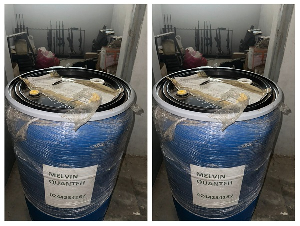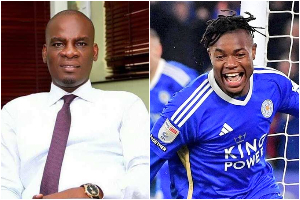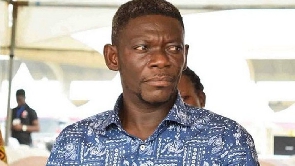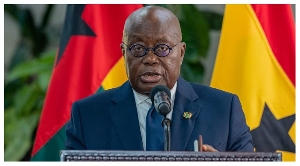Opinions of Wednesday, 24 August 2011
Columnist: Dadzie, Kweku
Reforming Or Revolting Against The Neo-Colonial State, Where Does Cpp Stand?
*
*Introduction*
*
*
The use of the question, *“**reforming or revolting against the neo-colonial
state, where does our party stand?**”**,* as the title for the whole issue
to be raised in this paper is motivated by the nature of confusion among
many people as to whether the neo-colonial state in Ghana needs a reform or
it is only a revolution that can salvage it. Simply put, is a revolution the
only answer to purge the neo-colonial state in Ghana? Is it worth sustaining
the neo-colonial state through reforms? This paper will attempt to look at
the possibilities of the socialist political party in Ghana that bears the
same name as the old CPP which ruled from 1957 to 1966. One factor for
examining today’s CPP is simply for the reason that it has been the most
highly criticized political party regarding its internal growth and its
possibility of gaining power with its scientific socialist ideology. The
context, therefore, shall firmly be placed to interrogate deeply whether the
CPP is taking the path to revolution or only to reform the neo-colonial
state. It will establish with concrete evidence and analysis which
reactionary actors led by Dr. Paa Kwesi Nduom who wants to maintain the
neo-colonial state and those who wish to see a revolution of the entire
wicked political and economic structure.**
The mere mentioning of neo-colonialism or the neo-colonial state brings
sharply into mind Dr. Kwame Nkrumah, founder of Ghana. Nkrumah provided the
most elaborate explanation of what a neo-colonial state entails, why the
need for changing the neo-colonial state and how that change can occur? In
fact, the latter is more significant to any concerned progressive after
having fully grasped what is the phenomenon of the neo-colonial state in
Ghana. Neo colonialism, according to Nkrumah, is the greatest danger at
present facing Africa, for that matter in Ghana (pg.173, Africa Must Unite).
It is a set of political, economic, social and colonial arrangements or
systems which continue to exist in a society, managed and controlled by *few
local property-ruling class* on behalf of their corresponding *foreign
property-ruling class*. The arrangement is a phenomenon which is heavily
imposed on the majority of the people who remain poor, unemployed, low
income-earned, unskilled, and uneducated. These arrangements designate a
continuation of colonialism wherein the majority of the people are denied
dominant control and management of the bulk of their wealth. This lopsided
state of affairs has, however, created for us one of the biggest of our
problems. The denial of opportunities for the ordinary people to participate
in the control and management of the enormous wealth of the country,
inhibits their influence in the process of making laws and policies as well
as their implementation. They earn little income in relation to the few
property-owned class who produce less but earn more. In short,
neo-colonialism is a replacement of colonialism but this time with local
marionettes in virtually all the political parties, media, NGOs, the
Government and many inter-governmental organisations.
*Neo-colonial features*
In Ghana, just like in other parts of Africa, it has undeniably been
established that one crucial feature of neocolonialism is balkanization or
divide and rule. The neo-colonial system endeavours to create fissions in
our national front, in order to achieve fragmentation. Let us for now not
delve into the numerous examples of deliberate manipulation among African
countries fragmented through proxy wars, etc. but rather concentrate on some
few cases in Ghana and later drop in some circumstances of competing groups
in our CPP as to which of them either intends achieving a revolution or a
reform of the neo-colonial enterprise.
As a result of efforts by leaders such as Dr. Nkrumah to prevent Ghana from
political fragmentation by advocating for unitary state against the ‘*Ma te
me ho*’ arguments for federalism, Ghana survived pre-independence attempt of
splitting into two. The colonial power, Britain, imposed on Ghana a
constitution that aimed at disintegrating our national unity. Even though
1951 constitution and the later 1957 constitution still fell far short of
the CPP's call for full independence, these constitutions gave powers to our
chiefs that conflicted with our fight against indirect rule. After
independence, CPP salvaged the situation by its practical economic and
social policies in order to neutralize the deliberate breeding of ethnic
strive by some local chiefs. For example, the increased Cocoa production in
areas where these chiefs were located became highly satisfactory among the
local people under those chiefs. CPP’s educational policy of boarding system
was one of the many social interventions to ensure cohesion of the national
unity project. Neo-colonialism intends to make superhuman efforts of
creating schism and rivalries among Ghanaians in order to continue
exploitation even in the absence of Europeans in the castle but under NDC
and NPP.
One will remiss in describing the features of neo-colonialism in Ghana’s
economic arrangement without fingering the wretched stealing and looting of
our gold and other natural resources by private multi-national companies.
The people of Ghana under Rawlings, Kufuor and Mills have suffered severely
from the sale of all state shares in AngloGold Ashanti. Ghana earns
virtually nothing from Gold mining, except the few crumbs from royalties and
tax revenue which later get corrupted and embezzled. Newmont continues its
cyanide spillage in river bodies in Kenyasi, Ahafo mines. They destroy large
Cocoa plantations and pay little compensation to farmers, neglecting the
communities to wallow in poverty. Today institutions such as the Minerals
Commission, Chamber of Mines and the Ministry of Environment Science and
Technology have become appendages of the neo-colonial state serving Western
interest.
In the brouhaha leading to the obnoxious approval of the Sales and Purchase
Agreement of the Ghana Telecom-Vodafone deal, some notable Nkrumaists like
Prof. Agyeman Badu Akosa, Dr. Nii Moi Thompson, Bright Akwetey and others
gave strong opposition against the Government and the deal. Surprisingly, a
so-called pretentious Nkrumaist, Nduom, who pretended to appear to be
against the deal made a strange and sudden U-turn. Missing in Action on the
day of voting in Parliament!!! Did he take some of the 5% shared to some
Parliamentarians for the deal as alleged by Hon. P.C .Appiah Ofori?
Consistency, it is said, is the very essence and definition of greatness.
With the expiration of the Cotonou Agreement, the emergence of the current
trade pact between the EU and Ghana as part of ECOWAS, signed as the Light
EPA was shamefully another commitment by our leaders, especially led by
Former President Kuffuor into another set of neo-colonial trading
arrangement which is based on reciprocity intended to flood our local market
and collapse infant and emerging industries. The neo-colonial trade system
has consistently made the West to determine the prices for our export
commodities. Trade imposition within this set of arrangement is surprisingly
worshipped by some elements like Dr. Nduom who labels himself as Nkrumaist,
especially when they took part in those wretched policies by Ex-President
Kuffour on trade pacts.
Certainly, the existing legal regime is neo-colonial. The laws of Ghana is
said to be shaped by the British Common Law, the Ghanaian Customary Law,
Statutes of Parliament and the lessons from our political history. Its
implementation has proven quite positive to some extent especially providing
such significant space for our multi-party democracy. Obviously this is the
product of the lessons learnt from the injury, hurt, damage, grievance, and
other adverse effects of violations of people’s human rights arising from
activities and in-activities both in public and private institutions during
periods of unconstitutional rule, as well as lessons learnt from how the
nature of these unconstitutional governments shaped the economy of the
country. However, it is worth mentioning that the existing legal regime
entrenches superior class domination of a few upon the majority of the
populace who remain poor. It is in effect, for instance under Article (71),
arrogates some ruling elites to certain privileges in the form of salaries
and emoluments which far outweighs our budget capacity as a poor country. In
February 2009, Chinery Hesse Committee’s report announced the following as
ex-gratia for our ex-Presidents alone; Six (6) fully insured brand new cars
which are to be maintained by the state and replaced every four years. They
were composed of three (3) saloon cars, two (2) cross country vehicles and
one all-purpose vehicle. Two (2) houses befitting a President; $1million
dollars for a foundation; Overseas travels; medical and dental services;
entertainment; non-taxable ex-gratia; GH¢460,000 (lump sum) and an office
with staff paid by the state 60days of international travels at the expense
of the tax-payers money. A review by the Ishmael Yamson Committee which was
established under President Mills’ administration came out with the
following as ex-gratia for our ex-president alone; Four (4) vehicles (two
saloon and two cross-country vehicles with drivers, all fully maintained,
insured and fuelled by the state); One (1) fully furnished house with
amenities; housing allowance with office accommodation (secured 24 hours);
domestic support services and paid utility bills (water, electricity and
telephone) among others. Having followed the issues, and the concerns raised
by millions of Ghanaians I believe strongly that ex-gratia confirms the
impression that politics has become a kind of human interaction not for
serving ones country, rather for personal gains and a means of accumulating
wealth. In constitutional law perspective, an ex-gratia payment is a payment
made without the giver recognising any liability or legal obligation. In
this regard, the people of Ghana, without any liability or legal obligation
should voluntarily or out of kindness pay the Ex-Presidents, the Speaker and
Deputy Speakers of Parliament, Parliamentarians, the Chief Justice and other
Justices of the Superior Court of Judicature, The Auditor General, the
Chairman and Deputy Chairman of the Electoral Commission, the Commissioner
for the Human Rights and the Administrative Justice and his deputies, the
District Assembly Common Fund Administrator; the Chairman, Vice Chairman and
the other members of National Council for Tertiary Education, Public
Services Commission, National Media Commission, the Lands Commission and the
NCCE. Meanwhile teachers under GNAT and NAGRAT, health professionals and low
ranking public servants receive little payt at the end of the month. Kudos
to the CPP led by Bright Akwetey for petitioning Parliament and calling for
an amendment to Article (71) in order to truly relate to the economic
condition of the ordinary Ghanaian and the economy as a whole.
The laws of Ghana have been fashioned towards predominantly satisfying and
protecting the ruling class. Under such neocolonial legal regime, the few
ruling class determine and implement the law to favour themselves. The
electoral system favours the property-ruling class since they can afford to
engage parliamentary or presidential process. Political parties and
politicians draw their resources from corporate interests who eventually
determine the arrangement to guarantee systemic naked-profiteering. There
are several practical examples which indicate class struggles in yearning
justice and security in Ghana under this neo-colonial state.
However, having observed the political activities of people like Dr. Paa
Kwesi Nduom, I can firmly conclude that he is striving to maintain and
manage the neo-colonial state, as contrary to revolting it as Nkrumah
expected. The word ‘*revolution*’ certainly appears to him and some few
people who unscrupulously label themselves as Nkrumaists, as something of
the past; something that can never materialize in Ghana today; something
that can be equated to the aftermath of Rawlings’ June 4th uprising, and
most embarrassingly something that the CPP of today no longer adheres. One
of Nkrumah’s objective stands after his overthrow was that a leader of any
progressive political party such as the CPP must have revolutionary
qualities to lead the organisation in revolting against the neo-colonial
state. What did Nkrumah mean by revolutionary qualities? It is interesting
to note that a person with revolutionary qualities must first commit ‘*class
suicide’*. The person must descend from his bourgeois class of a self-styled
intellectual, profit-driven individual and private sector-led preacher, to
the level of the ordinary oppressed class where he should live with them,
eat with them, learn from them and build with them. Then also at the
ordinary level, such a person needs to commit the energies of the people
towards economic liberation against exploitation in our mining communities,
fishing towns, urban factories and the ruthless cheating by the banking and
telecommunication sub-sectors. With honesty, Dr. Nduom, has not been able
fulfill this first leadership quality necessary for a socialist political
party like the CPP. Prof. Agyeman Badu Akosa seems more appealing than
Nduom.
In chapter (1) of “Consciencism” (Marxist philosophy), Nkrumah points to his
primordial roots and inspiration, thus “…*it was especially impossible to
read the works of Marx and Engels as desiccated abstract philosophies having
no bearing on our colonial situation. During my stay in America the
conviction was firmly created in me that a great deal in their thought could
assist us in the fight against colonialism.” *The earliest elaborate
explanation of revolution was done by Karl Marx and Engels from whom Nkrumah
drew significant thoughtful justification about how every society like ours
will surely go through a revolution. This is set within the extract below;
*Since new forms of society emerge from but are not imposed on the old a
process of evolution and revolution is always involved. It is the task of
the revolutionary to discern the evolutionary moments of the newly emerging
and progressive trend so as to promote its development and dominance over
the old and dying trend. The decisive moment, the revolutionary moment, is
when the final act is undertaken to formally assert and constitutionalise
the predominance of the new and the demise of the old.*
**
It is the task of any person interested in leading the CPP to discern the
evolutionary moments of the newly emerging and progressive trend so as to
promote its development and dominance over the old and dying trend. Today,
the dominant approach after carefully observing the politics some leading
members of the CPP seem to show truncation of the path necessary for
achieving a revolution. They seek to manage the neo-colonial state. This
incorrect direction is apparently being led by Dr. Paa Kwesi Nduom who often
brags about his strong US imperialist connections and who wouldn’t bother
aligning the CPP with political parties which believes in capitalism.
*ALUTA CONTINUA!!!*
* *
*FORWARD EVER*!!! SAY *NO* TO *NDUOM*!!!
Kweku Dadzie
kwekudadzie2000@gmail.com












